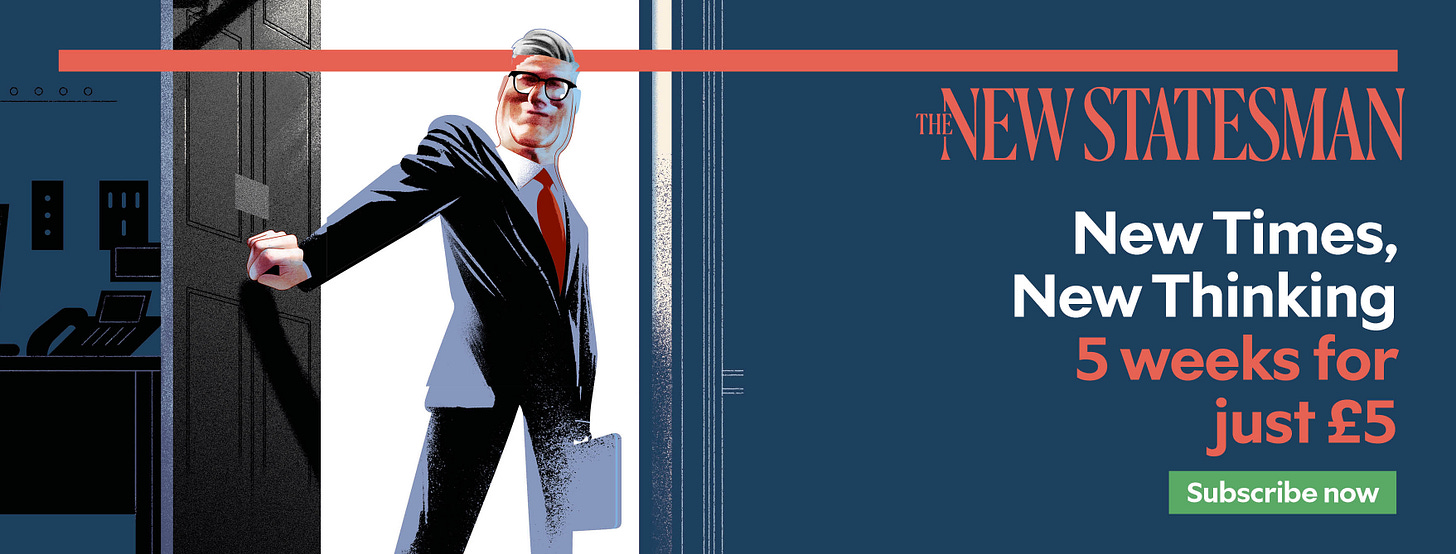Morning Call: The dangerous relationship
Keir Starmer’s hunger for quick wins with the US is storing up long-term defeats.
Good morning from Washington DC. It’s Freddie here. Westminster’s reaction to the Maga movement is bemusing. It’s as if the radio waves crossing the Atlantic get scattered, transforming President Trump into a Union-flag-waving royalist with a holiday home in Aberdeen. Thoughts on the US-UK trade deal below.
Peter Mandelson’s brief grimace was the only sign the government knew the ploy was a stretch. He was peering over Donald Trump’s left shoulder in the Oval Office as Keir Starmer’s voice burbled through the loudspeaker on the Resolute Desk. The Prime Minister was extolling the UK-US trade deal as a monument to the Allied victory in 1945. It was the start of an unconvincing sales pitch to those listening back home.
The reality lay to Trump’s right. There, a large chart with big green and red arrows showed that tariffs on the UK had risen by 6.6 points, while British tariffs on the US were down 3.3 points.
The Prime Minister was parading the special relationship while Trump was bragging about an American tour de force. What was going on? The president’s woes at home are key here: his poll numbers have cratered and a recession looms. So what’s more likely: that the nationalist president wanted to cut a deal in solidarity over 1945 or that he pressured No 10 in order to calm Wall Street and coax other countries to the negotiating table?
Speed did matter for British jobs in the steel and car industries. Tariffs on cars and steel and aluminium were indeed cut, while the 10 per cent baseline remains in place. But trumpeting Britain’s place atop the queue makes it seem the priority is upholding the perception of a special relationship. Ignore the grumbles that such analysis is cynical: delusions of grandeur make for poor policy.
We saw something similar when Starmer returned from the White House in February. He was garlanded like a British Talleyrand, but his main ask – for a security guarantee in Ukraine – was ignored. Ditto the promise that the UK would avoid tariffs: on Liberation Day, Britain got the same treatment as Morocco.
And what is to come might be even harder to stomach. As I reported yesterday, and as today’s Telegraph frontpage confirms, the Americans are demanding the government rely less on China.
Then there is chatter about a technology deal. As Andrew has noted, Starmer headed straight to Palantir’s offices after the White House in February with Mandelson, who was a cheerleader for the company before he returned to politics. The government seems to think Britain’s economic salvation lies in opening the door to Silicon Valley.
Anti-trust lawyers at the Department of Justice – the foot soldiers in the battle against tech companies’ feudalistic power – have told me that the British Competition and Markets Authority’s policy papers were once read with admiration. The CMA had pushed-back against Microsoft’s acquisition of Activision Blizzard, the gaming company, and forced Meta to divest Giphy.
Now, they lament that Rachel Reeves has made an Amazon executive the interim chair of the agency supposed to restrain corporate power. This week’s news that the American company DoorDash is plans to buy Deliveroo is the latest sign that British businesses over a certain size seem destined to be swallowed by American firms.
Remember the American author Denny Ludwell’s line from 1930: “We were Britain’s colony once, she will be our colony before she’s done. Not in name, but in fact. But we shan’t make Britain’s mistake: too wise to govern the world, we shall merely own it.”
The government is, therefore, gripped by short-termism. Dodging black holes five years from now incentivises hawking British assets. A hunger for quick wins can lead to dangerous bargains, with little room left for figuring out what type of economy they want to build. Everything is mitigation, in other words, and the trade deal with the US is only the latest example.
Freddie’s picks
New York Times columnist Ross Douthat tries to convince me ghosts are real over chicken salad and iced tea in Connecticut. We went back and forth over materialism, liberalism and why so many Maga Republicans are Catholics.
Finn makes a convincing case for why the new Pope is a centrist.
Rajan Menon asks whether Pakistan and India might resort to nuclear weapons.
Mailshot
Guardian: Unearthed comments from new pope alarm gay Catholics
Mail: Did Meghan break up Harry and David Beckham’s bromance?
Shawn McCreesh: Whither Melania?
Andrea Long Chu: Contra Ocean Vuong
Chris Murphy: Hawk Tuah girl returns
Kieran Yates: Among the giants
Lily Isaacs: The climax of Addison Rae








If there is any defeatism here it in Freddie's article and the,so far three comments here, that agree with him.
To first congratulate Starmer for what is a deal that has saved the steel and car industries and then accuse him of short termism is beyond belief. How long do you think he ought to have waited before attempting the perfect deal?
Any deal at any time with Trump is going to be subject to his whims so should he have waited until there is a new president.
As far as I can see Starmer struck the best deal he could get. Of course it is not as good as it was before ''Liberation Day'' but it is certainly better than what we had the morning after.
I'm glad that even the NS appears to have realised that the Empire has gone and that Britain no longer rules the world. Starmer knows that and what that entails so it is no good railing against that.
I would be surprised if the EU or any other country apart from China does any better with deals with Trump. It is worth noting that the EU is trying to cut a deal and Macron too with his special plea for Cognac. Is this too short termism or is it realism?
UK at the head of the queue that nobody else wants to join 🤔